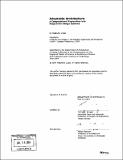Adaptable architecture : a computational exploration into responsive design systems
Author(s)
Zulas, Alejandro, 1976-
DownloadFull printable version (11.76Mb)
Other Contributors
Massachusetts Institute of Technology. Dept. of Architecture.
Advisor
Terry W. Knight.
Terms of use
Metadata
Show full item recordAbstract
Based on the fact that architecture is, among other things, the crystallization of a mediation among design intentions (function), meaning and contextual constraints (performance), we as designers are obligated to produce morphologically flexible & adaptive design solutions; both during the design process and as a final outcome. In that sense this thesis is an open ended exploration of embedding rational adaptability to object design through computational tools. This thesis will speculate on the advantages of thinking architecture in terms of "adaptation" in an action-reaction fashion, evolving from the seed idea of "motion" in architecture but rather pushing and exploring the potential of digitally designed responsive buildings and the dissection of its methodological approach. Empirically, it will look into some of nature's responsive designs, arguing that buildings can be conceptualized as adaptable living organisms. It will also analyze the role of computational tools and programming languages as meaningful mediums that help designers to better understand, set-up, define and re-define design problems. It will argue that more than an automated provider of an endless number of design solution computers can work as a systematic tool, making us more conscious during the design process.
Description
Thesis (S.M.)--Massachusetts Institute of Technology, Dept. of Architecture, 2004. Includes bibliographical references (p. 61-62).
Date issued
2004Department
Massachusetts Institute of Technology. Department of ArchitecturePublisher
Massachusetts Institute of Technology
Keywords
Architecture.